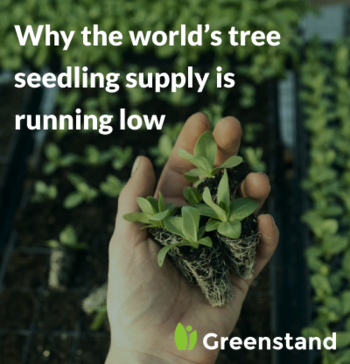Why the world's seedling supply is running low
Reforestation efforts are gaining ground in the U.S. and around the world, but the global supply of seedlings can’t keep up with demand. Researchers and local authorities are calling for greater investment in seed collecting and training to help close the seedling supply gap, but wildfires and other sources of environmental stress have slowed our progress.
Introduction
Reforestation is a major way we can reduce greenhouse gas emissions. But restoring about 2.5 billion acres of degraded forest land could require a billion seedlings, and that’s just a fraction of the amount of land that projects around the world have committed to restoring, a 2017 study said.
Some reforestation efforts are encountering challenges ranging from the high cost of seedlings to the loss of educated workers who collect seeds.
Private nurseries are responsible for 80% of seedling production in the U.S. Private and public tree nurseries around the country could potentially double their total seedling production to help reforestation efforts, but their biggest hurdle is a shortage of labor, according to American Forests. In many places, a long-term lack of investment in the skilled workers and workforce training needed for seed collection, testing, and storage, has contributed to limited seed inventory and higher seed costs.
Seedling Supply in the U.S.
President Joe Biden has advocated for a Civilian Climate Corps initiative, as part of a job creation proposal. The program could resemble President Franklin D. Roosevelt’s Civilian Conservation Corps, which employed young men in national forest and park improvements. Though it’s not clear how much Biden’s Corps would focus on reforestation, building a workforce educated in seedlings and nursery practices would help alleviate nurseries’ labor shortage.
Expanding our supply of seedlings through existing nurseries could mean building more greenhouse space, buying more land for seed beds, repurposing existing nursery space, and expanding all of the infrastructure necessary to support those operations.
Some reforestation efforts run by state governments, such as California’s tree seedling production program at the L.A. Moran Reforestation Center, depend on the public to help with seed collection and identifying healthy trees that can produce seed crops. Those seeds, in turn, help restore parts of the state devastated by wildfires.
Public Investment
Researchers from the Nature Conservancy, U.S. Department of Agriculture, and other institutions say increasing the seedling supply requires public support and incentives for landowners to participate in reforestation programs.
Greenstand’s mission is to support reforestation projects while enabling impoverished communities and individuals to pull themselves out of poverty. We do this by verifying that our tree growers are being paid fairly by the planting organizations that employ them. Growing and tracking trees is becoming a new type of green job that benefits the planet and its people. One of our partner projects, the #FreetownTheTreeTown initiative out of Sierra Leone, started by the local government, raised funds and hired hundreds of Freetown residents to take part in planting 1 million trees. Their project, which includes cultivating trees from seed in nurseries, will make a world of difference for tree canopy cover and disaster mitigation throughout the city. This is a scalable solution that cities around the world could easily emulate by partnering with Greenstand for mapping and monitoring.
Conclusion
Though climate change and workforce deficits don’t have short-term solutions, supporting reforestation efforts through tree seed collection, maintaining nurseries, and job training can help alleviate the seedling shortage.
Is your planting project looking to showcase their environmental and social impacts? Greenstand’s Treetracker system brings transparency to the reforestation industry. Please fill out our Treetracker project survey and a Greenstander will be in touch shortly.
Sylvia Carignan
Communications Contributor
sycarignan@outlook.com
Back
